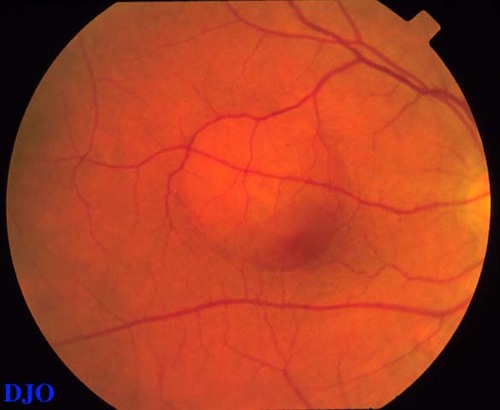|
|
 |
 |
 |
 |
|
|
Central Serous Chorioretinopathy
|
Printer Friendly
|



Scott Burk, MD, PhD N/A January 13, 2003
|
What is central serous chorioretinopathy?
Central serous chorioretinopathy is a collection of fluid under the retina that results in visual distortion. As the name suggests, the collection of fluid affects central vision where it causes the most visual disturbance.
What are the symptoms of central serous chorioretinopathy?
Patients often complain of a blind spot, decreased or blurry vision, and distortion of shapes such that straight lines may appear bent or crooked. The vision may be minimally to significantly affected with visual acuities ranging FROM normal (20/20) to 20/200.
Who gets central serous chorioretinopathy?
The disease primarily affects young adults ages 20-45. Men are affected 10 times more frequently than women. Many patients with central serous chorioretinopathy are noted to live under a high level of stress.
Why does central serous chorioretinopathy occur?
The exact etiology of central serous chorioretinopathy is highly controversial. However, there appears to be an imbalance in the amount of fluid which enters the subretinal space and the ability to remove it, resulting in a net accumulation of fluid beneath the retina. Some experimental evidence suggests high blood levels of epinephrine and cortisol hormones may be responsible.
What is the prognosis for central serous chorioretinopathy?
Most patients with central serous chorioretinopathy will spontaneously recover visual acuity in 6 months (average time to recovery 3-4 months). Many patients will have some residual symptoms, such as distortion, decreased color and contrast sensitivity, as well as visual difficulty at night. Despite an overall good prognosis, 40-50% of patients experience one or more recurrences.
Is there any treatment available?
There is no medical therapy proven to be effective in treating central serous chorioretinopathy. Laser photocoagulation treatment is effective in shortening the duration of the disease; however, it does not appear to alter the final visual acuity or the recurrence rate. Treatment with laser is controversial because there are potential complications (as with any surgery) and there does not appear to be any long term benefit to the treatment.
How do I get more information?
If you HAVING visual distortion, or blind spots, you should see your local ophthalmologist. In the New England area the Massachusetts Eye and Ear Infirmary has a general ophthalmology service for non-emergent problems, and an emergency room open 24 hours for ocular emergencies. | |
 Figure 1
Figure 1
Photograph of an eye with central serous chorioretinopathy demonstrating the "blister" of fluid underneath the retina
|
|
|
The information and recommendations appearing on these pages
are informational only and is not intended to be a basis for diagnosis, treatment
or any other clinical application. For specific information concerning your personal
medical condition, the DJO suggests that you consult your physician.
|
|
 |
 |
 |

|
|
 Welcome, please sign in
Welcome, please sign in  Welcome, please sign in
Welcome, please sign in